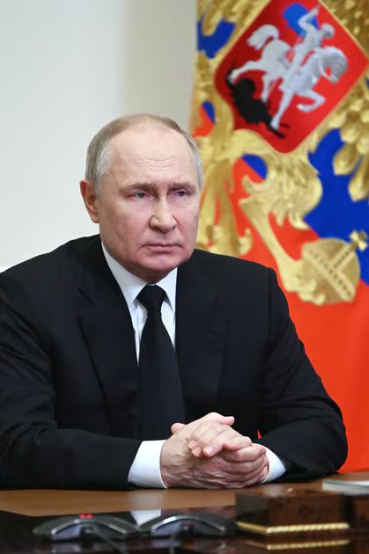【中美创新时报2024年3月24日讯】(记者温友平编译)不到一周前,俄罗斯总统弗拉基米尔·普京(Vladimir Putin)以有史以来最高的得票率宣布第五次连任,通过一场精心策划的选举向国家和世界表明他牢牢掌握着控制权。几天后,一个令人震惊的反面出现了:他所吹嘘的安全机构未能阻止俄罗斯20年来最致命的恐怖袭击。《纽约时报》记者安东·特罗扬诺夫斯基(Anton Troianovski)对此进行了下述报道。
周五在莫斯科郊区的一个音乐厅发生的袭击事件造成至少 133 人死亡,这对普京作为国家安全至高无上的领导人的光环造成了打击。在乌克兰战争持续了两年之后尤其如此,他称这场战争是俄罗斯生存的关键,并且他将其视为上周日选举后的首要任务。
俄罗斯政治学家亚历山大·基涅夫(Alexander Kynev)在莫斯科接受电话采访时表示,“这次选举显示出一场看似充满信心的胜利。” “突然之间,在一场充满信心的胜利的背景下,出现了这种明显的羞辱。”
普京似乎对这次袭击感到措手不及。他花了 19 个多小时才向全国发表关于这次袭击事件的讲话,这是自 2004 年该国南部别斯兰学校围困事件以来俄罗斯最严重的一次死亡事件,该事件夺去了 334 人的生命。当他这样做时,这位俄罗斯领导人对越来越多的证据表明伊斯兰国组织的一个分支实施了这次袭击只字不提。
相反,普京暗示乌克兰是这场悲剧的幕后黑手,并表示袭击者的行为“就像纳粹一样”,“曾经在被占领土上进行过屠杀”——这让人想起他经常错误地将当今的乌克兰描述为由纳粹统治的新纳粹分子。
普京在五分钟的演讲结束时说道:“我们前线的同志、全国所有公民,现在的共同职责是团结一致。”他试图将打击恐怖主义与入侵乌克兰混为一谈。
问题是有多少俄罗斯公众会接受他的论点。他们可能会问,在入侵以及与西方发生冲突的情况下,普京是否真的把国家的安全利益放在心上——或者他是否像他的许多对手所说的那样,不幸地放弃了这些利益。
普京显然无视美国关于潜在恐怖袭击的警告,这一事实可能会加深人们的怀疑。他没有根据警告采取行动并加强安全,而是将其视为“挑衅性言论”。
普京周二在俄罗斯国内情报机构俄罗斯联邦安全局的一次演讲中谈到西方的警告时表示,“所有这些都像是公然的勒索,旨在恐吓和破坏我们社会的稳定。” 周五的袭击事件发生后,他的一些流亡批评者引用他的回应作为总统脱离俄罗斯真正安全担忧的证据。
这些批评者说,普京并没有让社会免受真正的暴力恐怖分子的侵害,而是指示他的安全部门追捕持不同政见者、记者和任何被认为对克里姆林宫“传统价值观”定义构成威胁的人。
一个典型的例子是:就在袭击发生前几个小时,官方媒体报道称,俄罗斯当局已将“LGBT 运动”添加到“恐怖分子和极端分子”的官方名单中;俄罗斯去年已经宣布同性恋权利运动为非法。 恐怖主义也是检察官对上个月去世的被监禁的反对派领导人阿列克谢·纳瓦尔尼提出的众多指控之一。
“在一个反恐特种部队追捕网上评论者的国家,”流亡的俄罗斯军事分析家鲁斯兰·莱维耶夫周六在社交媒体帖子中写道,“恐怖分子永远会感到自由。”
尽管伊斯兰国组织一再声称对此次袭击负责,而乌克兰否认与此事有任何关系,但克里姆林宫的使者还是竭尽全力试图让俄罗斯公众相信这只是一个诡计。
国家电视台主持人奥尔加·斯卡贝耶娃 (Olga Skabeyeva) 在 Telegram 上写道,乌克兰军事情报部门发现袭击者“看起来像伊斯兰国”。但这不是伊斯兰国。” 国营 RT 电视网编辑玛格丽塔·西蒙扬 (Margarita Simonyan) 写道,有关伊斯兰国组织责任的报道相当于美国新闻媒体的“基本伎俩”。
在国营第一频道的黄金时段电视脱口秀节目中,俄罗斯最著名的极端保守思想家亚历山大·杜金宣称,乌克兰领导层和“他们在西方情报部门的傀儡主人”肯定组织了这次袭击。
杜金说,这是一种“破坏对总统信任”的行为,它向普通俄罗斯人表明,他们别无选择,只能团结起来支持普京对乌克兰的战争。
杜金的女儿在 2022 年莫斯科附近的一次汽车爆炸中丧生,美国官员表示,这起事件确实得到了乌克兰政府部分部门的授权,但美国并未参与其中。
美国官员表示,没有证据表明乌克兰参与了音乐厅袭击事件,乌克兰官员嘲笑了俄罗斯的指控。乌克兰军事情报机构代表安德烈·尤索夫表示,普京关于袭击者逃往乌克兰并打算在乌克兰当局帮助下越境进入乌克兰的说法毫无意义。
自2022年2月对乌克兰发动全面入侵以来,近几个月来,普京显得比以往任何时候都更加自信。俄罗斯军队在前线重新占据了主动权,而乌克兰的部队则在西方支持疲弱和短缺的情况下苦苦挣扎。
在俄罗斯国内,这次选举及其预定结果凸显了普京对国家政治的主导地位。上个月,他被囚禁的宿敌纳瓦尔尼去世,导致俄罗斯反对派残余组织混乱、士气低落。
基涅夫表示,他相信许多俄罗斯人现在都感到“震惊”,因为“恢复秩序一直是弗拉基米尔·普京的名片”。
普京执政初期以恐怖袭击为标志,最终导致别斯兰学校围困事件。他利用这些暴力事件来证明他取消政治自由的合理性。周五之前,首都地区最近发生的造成大规模伤亡的恐怖袭击是 2011 年莫斯科机场发生的自杀式爆炸事件,造成 37 人死亡。
尽管如此,考虑到克里姆林宫镇压异见和新闻媒体的效率,基涅夫预测,只要暴力不再重演,音乐厅袭击的政治后果将是有限的。
“说实话,”他说,“我们的社会已经习惯了对不方便的话题保持沉默。”
本文最初发表于《纽约时报》
题图:俄罗斯总统弗拉基米尔·普京 (PAVEL BYRKIN/POOL/法新社 VIA GETTY IMAGES)
附原英文报道:
Deadly Moscow attack shatters Putin’s security promise to Russians
By Anton Troianovski New York Times,Updated March 23, 2024
Less than a week ago, Russia President Vladimir Putin claimed a fifth term with his highest-ever share of the vote, using a stage-managed election to show the nation and the world that he was firmly in control.
Just days later came a searing counterpoint: His vaunted security apparatus failed to prevent Russia’s deadliest terrorist attack in 20 years.
Friday’s assault, which killed at least 133 people at a concert hall in suburban Moscow, was a blow to Putin’s aura as a leader for whom national security is paramount. That is especially true after two years of a war in Ukraine that he describes as key to Russia’s survival — and which he cast as his top priority after the election last Sunday.
“The election demonstrated a seemingly confident victory,” Alexander Kynev, a Russian political scientist, said in a phone interview from Moscow. “And suddenly, against the backdrop of a confident victory, there’s this demonstrative humiliation.”
Putin seemed blindsided by the assault. It took him more than 19 hours to address the nation about the attack, the deadliest in Russia since the 2004 school siege in Beslan, in the country’s south, which claimed 334 lives. When he did, the Russian leader said nothing about the mounting evidence that a branch of the Islamic State group committed the attack.
Instead, Putin hinted that Ukraine was behind the tragedy and said the assailants had acted “just like the Nazis,” who “once carried out massacres in the occupied territories” — evoking his frequent, false description of present-day Ukraine as being run by neo-Nazis.
“Our common duty now — our comrades at the front, all citizens of the country — is to be together in one formation,” Putin said at the end of a five-minute speech, trying to conflate the fight against terrorism with his invasion of Ukraine.
The question is how much of the Russian public will buy into his argument. They might ask whether Putin, with the invasion and his conflict with the West, truly has the country’s security interests at heart — or whether he is woefully forsaking them, as many of his opponents say he is.
The fact that Putin apparently ignored a warning from the United States about a potential terrorist attack is likely to deepen the skepticism. Instead of acting on the warnings and tightening security, he dismissed them as “provocative statements.”
“All this resembles outright blackmail and an intention to intimidate and destabilize our society,” Putin said Tuesday in a speech to the FSB, Russia’s domestic intelligence agency, referring to the Western warnings. After Friday’s attack, some of his exiled critics have cited his response as evidence of the president’s detachment from Russia’s true security concerns.
Rather than keeping society safe from actual, violent terrorists, those critics say, Putin has directed his security services to pursue dissidents, journalists and anyone deemed a threat to the Kremlin’s definition of “traditional values.”
A case in point: Just hours before the attack, state media reported that Russian authorities had added “the LGBT movement” to an official list of “terrorists and extremists”; Russia had already outlawed the gay rights movement last year. Terrorism was also among the many charges prosecutors leveled against Alexei Navalny, the imprisoned opposition leader who died last month.
“In a country in which counterterrorism special forces chase after online commenters,” Ruslan Leviev, an exiled Russian military analyst, wrote in a social media post Saturday, “terrorists will always feel free.”
Even as the Islamic State group repeatedly claimed responsibility for the attack and Ukraine denied any involvement, the Kremlin’s messengers pushed into overdrive to try to convince the Russian public that this was merely a ruse.
Olga Skabeyeva, a state television host, wrote on Telegram that Ukrainian military intelligence had found assailants “who would look like ISIS. But this is no ISIS.” Margarita Simonyan, editor of the state-run RT television network, wrote that reports of Islamic State group responsibility amounted to a “basic sleight of hand” by the American news media.
On a prime-time television talk show on the state-run Channel 1, Russia’s best-known ultraconservative ideologue, Alexander Dugin, declared that Ukraine’s leadership and “their puppet masters in the Western intelligence services” had surely organized the attack.
It was an effort to “undermine trust in the president,” Dugin said, and it showed regular Russians that they had no choice but to unite behind Putin’s war against Ukraine.
Dugin’s daughter was killed in a car bombing near Moscow in 2022 that U.S. officials said was indeed authorized by parts of the Ukrainian government, but without U.S. involvement.
U.S. officials have said there is no evidence of Ukrainian involvement in the concert hall attack, and Ukrainian officials ridiculed the Russian accusations. Andriy Yusov, a representative of Ukraine’s military intelligence agency, said Putin’s claim that the attackers had fled toward Ukraine and intended to cross into it, with the help of Ukrainian authorities, made no sense.
In recent months, Putin has appeared more confident than at any other point since he launched his full-scale invasion of Ukraine in February 2022. Russian forces have retaken the initiative on the front line, while Ukraine is struggling amid flagging Western support and a shortage of troops.
Inside Russia, the election — and its predetermined outcome — underscored Putin’s dominance over the nation’s politics. The death last month of his imprisoned nemesis, Navalny, left what remained of Russia’s opposition disorganized and demoralized.
Kynev said he believed many Russians were now in “shock,” because “restoring order has always been Vladimir Putin’s calling card.”
Putin’s early years in power were marked by terrorist attacks, culminating in the Beslan school siege; he used those violent episodes to justify his rollback of political freedoms. Before Friday, the most recent mass-casualty terrorist attack in the capital region was a suicide bombing at an airport in Moscow in 2011 that killed 37 people.
Still, given the Kremlin’s efficacy in cracking down on dissent and the news media, Kynev predicted that the political consequences of the concert hall attack would be limited, as long as the violence was not repeated.
“To be honest,” he said, “our society has gotten used to keeping quiet about inconvenient topics.”
This article originally appeared in The New York Times.

